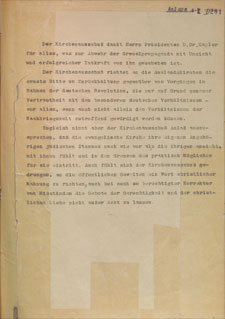Von Pechmann: Protection for Non-Aryan Christians
A nationwide boycott of Jewish businesses, attorneys and physicians unprecedented in Germany took place on April 1, 1933. Foreign criticism of police actions against political opponents and Jewish fellow citizens following the Reichstag Fire of February 27, 1933 served as the pretext. Julius Streicher (1885–1946), Gauleiter of Franconia, was the organizer of the campaign, which had become known a few days beforehand.
Two days prior to the boycott, Wilhelm Freiherr von Pechmann placed a phone call to Johannes Hosemann (1881–1947), the head of the highest body of the German Evangelical Church Union. Von Pechmann entreated him to encourage a Protestant or a collective Protestant and Catholic protest against the boycott. Since Hosemann, making reference to Hitler’s statements, responded evasively, von Pechmann turned to Hermann Kapler (1867–1941), president of the German Evangelical Church Union but, once again, without any success. Württemberg Regional Bishop Theophil Wurm (1868–1953) also called on the Church Union to act but it did not want a protest to jeopardize the talks it was just opening with the Nazi state.
Catholic lay circles also attempted to move their episcopal sees to protest. They were thwarted by the bishops’ disinterest, anti-Jewish antipathy and fear of adverse consequences for their own interests.
The National Socialists’ anti-Jewish policy entered its next phase one week after the boycott with the “Law for the Restoration of the Professional Civil Service”. Given the belief in the Jews’ unduly large negative influence in Germany, which was widespread even in the church, and the church’s disapproval of left-wing politicians, resistance never materialized. Church protest did not stir until the German Christians applied the Arian paragraphs in the regional churches under their control.
On April 25-26, 1933, the German Evangelical Church Committee held a special meeting at which the ecclesio-political situation in the Reich and in the individual regional churches was supposed to be discussed. A few days beforehand, the Nazi state had intervened in the Mecklenburg regional church. Kapler and Hitler spoke on the phone shortly before the meeting, however, and the discussion of so-called Jewish Question originally on the agenda was tabled.
Von Pechmann attended this meeting as the representative of the German Evangelical Church Congress. He doubted that the churches’ freedom would last: Not calling the German chancellor’s intentions into question, but who guarantees the church’s freedom when thousand-year-old rights could be swept away with a stroke of the pen? (Evangelisches Zentralarchiv in Berlin, 1/3210). When the other committee members indicated their willingness to endow Kapler with a sweeping mandate to negotiate the future reform of the church constitution, von Pechmann announced his resignation from the committee. This move was not accepted of course.
When the Jewish Question was addressed, von Pechmann reported on appeals for help from so-called non-Aryan members of the church. The church owed these people protection and was not allowed to leave them feeling that the church had abandoned them without a word at their moment of direst need. Its own faithful members were finally owed a comforting, enheartening statement of protection (ibid.).
The view that the church would have to raise its voice was not accepted in the discussions that followed. Instead, worries about dramatic Jewish domination and fear that a public statement might be used by the government against the church or by foreign countries against the German Reich prevailed. In addition, many believed that the Nazi’s racial laws were legitimate. Other speakers stressed that such action lay outside the church’s purview or evoked the peril of an influx of baptized Jews into the Protestant church, which a statement in support of them would precipitate.
The discussion ended with a resolution to forward von Pechmann’s diplomatically and circumspectly formulated petition in support of church members of Jewish stock (ibid.) along with the arguments put forth in the course of the debate to President Kapler for his further disposal. Ultimately, von Pechmann’s initiative remained unsuccessful.
Source / title
- © Evangelisches Zentralarchiv in Berlin, 1/3210

